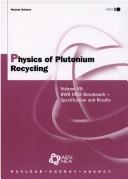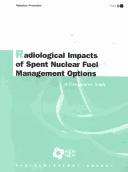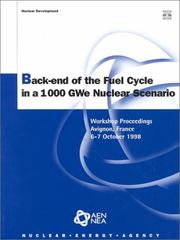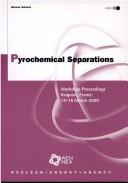| Listing 1 - 10 of 20 | << page >> |
Sort by
|
Book
Year: 2019 Publisher: Paris, France : Organisation for Economic Co-operation and Development Publishing,
Abstract | Keywords | Export | Availability | Bookmark
 Loading...
Loading...Choose an application
- Reference Manager
- EndNote
- RefWorks (Direct export to RefWorks)
Nuclear Energy Data is the Nuclear Energy Agency's annual compilation of statistics and country reports documenting nuclear power status in NEA member countries and in the OECD area. Information provided by governments includes statistics on total electricity produced by all sources and by nuclear power, fuel cycle capacities and requirements, and projections to 2035, where available. Country reports summarise energy policies, updates of the status in nuclear energy programmes and fuel cycle developments. In 2017, nuclear power continued to supply significant amounts of low-carbon baseload electricity, in a context of strong competition from low-cost fossil fuels and renewable energy sources. Governments committed to having nuclear power in the energy mix advanced plans for developing or increasing nuclear generating capacity, with the preparation of new build projects making progress in Finland, Hungary, Turkey and the United Kingdom. Further details on these and other developments are provided in the publication's numerous tables, graphs and country reports.

ISBN: 1280034599 9786610034598 926429905X 9264199055 Year: 2003 Publisher: Paris : OECD Publishing,
Abstract | Keywords | Export | Availability | Bookmark
 Loading...
Loading...Choose an application
- Reference Manager
- EndNote
- RefWorks (Direct export to RefWorks)
The OECD/NEA Working Party on the Physics of Plutonium Fuels and Innovative Fuel Cycles (WPPR) conducted a physics code benchmark test for the recycling of plutonium as PuO2/UO2 mixed-oxide (MOX) fuel in boiling water reactors (BWRs) compared to pressurised water reactors (PWRs). This volume reports on the benchmark results and conclusions that can be drawn from it.

ISBN: 1280034211 9786610034215 9264182020 9789264182028 9264176578 Year: 2000 Publisher: Paris : OECD Publishing,
Abstract | Keywords | Export | Availability | Bookmark
 Loading...
Loading...Choose an application
- Reference Manager
- EndNote
- RefWorks (Direct export to RefWorks)
Given its potential significance for public health and the environment, the impact of radioactive releases during important steps of nuclear energy production must be considered when selecting among different fuel cycles. With this in mind, the OECD Nuclear Energy Agency (NEA) has undertaken a comparative study of the radiological impacts of two main fuel cycle options: one with and one without reprocessing of spent nuclear fuel. The study compares the respective impacts of the two options based on generic models and assumptions as well as actual data. It concludes that the difference between them is not significant. A wealth of recent data assembled and evaluated by an international expert team is provided in annex.
Nuclear fuels -- Management. --- Nuclear fuels. --- Spent reactor fuels. --- Spent reactor fuels --- Reactor fuel reprocessing --- Nuclear fuels --- Radiation --- Nuclear Engineering --- Mechanical Engineering --- Engineering & Applied Sciences --- Management --- Safety measures --- Atomic fuel --- Fission fuel --- Nuclear reactors --- Reactor fuels --- Nuclear reactor fuel reprocessing --- Reprocessing of nuclear fuels --- Spent reactor fuel processing --- Fuel --- Reactor fuel reprocessing. --- Management. --- Radioactive substances --- Fission products --- Waste products --- Accelerator-driven systems

ISBN: 1280034610 9786610034611 9264199586 9264199578 Year: 2002 Publisher: Paris : OECD Publishing,
Abstract | Keywords | Export | Availability | Bookmark
 Loading...
Loading...Choose an application
- Reference Manager
- EndNote
- RefWorks (Direct export to RefWorks)
Although the recycling of plutonium as thermal mixed-oxide (MOX) fuel in pressurised water reactors (PWRs) is now well-established on a commercial scale, many physics questions remain. The main question addressed in this report is the number of times plutonium can effectively be recycled in a PWR. This report describes in particular an exercise based on a realistic, multiple-recycle scenario, which followed plutonium through five generations of recycling in a PWR. It considered both a standard PWR design currently in use and a highly moderated design. The latter is a possible option for a dedicated, MOX-fuelled PWR in which it would be possible to optimise the moderation for plutonium. The study of these two designs in parallel has provided a better understanding of their relative merits, as well as insight into the limitations of multiple recycling and the long-term toxicity of fission products and actinides.
Plutonium -- Recycling. --- Plutonium as fuel. --- Reactor fuel reprocessing. --- Plutonium --- Recycling. --- Transuranium elements --- Transplutonium elements
Book
ISBN: 1000054131 3731505169 Year: 2017 Publisher: KIT Scientific Publishing
Abstract | Keywords | Export | Availability | Bookmark
 Loading...
Loading...Choose an application
- Reference Manager
- EndNote
- RefWorks (Direct export to RefWorks)
Thermal and neutron physics analysis show that above certain concentrations of the isotope Pu-238 hypothetical nuclear explosive devices, made of reactor-grade plutonium, are technically not feasible. Future proliferation-proof fuel cycles are proposed which make use of methods of actinide tansmutation.Reactors operating in the thorium/uranium fuel cyce are loaded with <20% U-235 uranium fuel which can be made proliferation-proof against re-enrichment by adding a certain ppm level of U-232.
Enrichment --- Anreicherung --- Wiederaufarbeitung --- hochangereichertes Uran --- Plutonium --- Proliferation --- Reprocessing --- high enriched Uranium.Proliferation
Book
Year: 2004 Publisher: Paris : OECD Publishing,
Abstract | Keywords | Export | Availability | Bookmark
 Loading...
Loading...Choose an application
- Reference Manager
- EndNote
- RefWorks (Direct export to RefWorks)
In October 2001, the Stability Pact and the OECD launched the Regulatory Governance Initiative (RGI) to strengthen the institutional, knowledge and process capacities for developing and implementing more efficient and effective regulation, supportive of sound and competitive markets. The RGI is one of the policy implementation initiatives under the Investment Compact (the South East Europe Compact for Reform, Investment, Integrity and Growth) of the Stability Pact. This report of the Regulatory Governance Initiative provides an assessment on the progress of regulatory governance reforms in South East Europe (SEE), and the remaining reform challenges. It includes the Governance Action Plans developed by the SEE countries. Short-term reform priorities identified by the countries provide the basis for the Agenda for Regional Action, an overview of main governance reform trends in the SEE region and recommendations for the successful implementation of reforms. The report responds to the decision, taken by the Ministers from South East Europe (SEE) at the meeting in Vienna in July 2003, to place major emphasis on reviewing progress in the area of governance at their 2004 Ministerial meeting. It aims to inform policy-makers, donors, investors and the international community of progress in regulatory governance reforms in South East Europe. Practitioners in the region can draw on this report as a guide for their work in the future.
Governance --- Finance and Investment --- Reactor fuel reprocessing --- Nuclear fuel claddings --- Alpha-bearing wastes --- Congresses --- Waste disposal --- Waste disposal. --- Congresses.
Book
ISBN: 1282304666 9786612304668 9264047735 9264047727 Year: 2009 Publisher: Paris : OECD : Nuclear Energy Agency,
Abstract | Keywords | Export | Availability | Bookmark
 Loading...
Loading...Choose an application
- Reference Manager
- EndNote
- RefWorks (Direct export to RefWorks)
This 2009 edition of Nuclear Energy Data, the OECD Nuclear Energy Agency's annual compilation of essential statistics on nuclear energy in OECD countries, provides information on plans for new nuclear construction, nuclear fuel cycle developments and projections of installed nuclear capacity to 2035 in OECD member countries. This comprehensive overview of the current situation and expected trends in various sectors of the nuclear fuel cycle provides authoritative information for policy makers, experts and academics working in the nuclear energy field.
Electric power production -- Statistics -- Periodicals. --- Nuclear power plants -- Statistics -- Periodicals. --- Organisation for Economic Co-operation and Development -- Periodicals. --- Nuclear industry --- Nuclear power plants --- Electric utilities --- Reactor fuel reprocessing --- Nuclear reactor fuel reprocessing --- Reprocessing of nuclear fuels --- Spent reactor fuel processing --- Atomic power plants --- Nuclear power stations --- Power plants, Nuclear --- Atomic energy industries --- Atomic industry --- Atomic power industry --- Nuclear energy industry --- Nuclear power industry --- Fission products --- Nuclear fuels --- Waste products --- Accelerator-driven systems --- Nuclear facilities --- Power-plants --- Antinuclear movement --- Nuclear energy --- Energy industries

ISBN: 1280034149 9786610034147 9264173854 9264171169 Year: 1999 Publisher: Paris : OECD Publishing,
Abstract | Keywords | Export | Availability | Bookmark
 Loading...
Loading...Choose an application
- Reference Manager
- EndNote
- RefWorks (Direct export to RefWorks)
The optimisation of the nuclear fuel cycle is a key issue for the sustainability of nuclear energy. This book presents the papers from a workshop which investigated alternative nuclear energy futures, with emphasis on back-end of the fuel cycle options that could enhance the sustainability of nuclear energy in the long term, to 2050 and beyond. The papers lay out the conditions that need to be fulfilled for nuclear energy to remain a viable option and highlight the technological and strategic developments underway to address those issues. Subjects covered include natural resource management, radioactive waste minimisation, cost reduction and proliferation resistance aspects of alternative reactor and fuel cycle technologies.
Nuclear Energy --- Nuclear fuel reprocessing --- Nuclear energy --- Sustainable development --- Mechanical Engineering --- Engineering & Applied Sciences --- Nuclear Engineering --- France --- Energie nucléaire --- Congresses --- Congrès

ISBN: 1280034289 9786610034284 9264189734 9789264189737 9264184430 Year: 2001 Publisher: Paris : OECD Publishing,
Abstract | Keywords | Export | Availability | Bookmark
 Loading...
Loading...Choose an application
- Reference Manager
- EndNote
- RefWorks (Direct export to RefWorks)
The industrial treatment of spent nuclear fuel is presently performed using different wet chemical processes. Alternative dry processes, using pyrochemical methods, have received some attention due to their potential advantages in terms of plant design and criticality safety, as well as radiation dose. Recent progress in the transmutation of long-lived fission products and minor actinides has brought renewed interest in pyrochemical methods, as effective transmutation will be based on multi-recycling of the fuel with very high burn-up and short cooling times, conditions under which pyrochemical methods offer various advantages over wet processes. Studies of pyrochemical processes have so far been carried out at laboratory level. Considerable R&D work is still required in order to upgrade these processes to the current level of industrial aqueous processing.
ransmutation (Chemistry) -- Congresses. --- Reactor fuel reprocessing -- Congresses. --- Separation (Technology) -- Congresses. --- Reactor fuel reprocessing --- Separation (Technology) --- Transmutation (Chemistry) --- Nuclear Engineering --- Mechanical Engineering --- Engineering & Applied Sciences --- Metals, Transmutation of --- Transmutation of elements --- Transmutation of metals --- Atoms --- Nuclear physics --- Radioactivity --- France --- Combustibles nucléaires irradiés --- Séparation (Technologie) --- Transmutation (Chimie) --- Congresses --- Traitement --- Congrés --- Congrès
Book
ISBN: 1281784818 9786611784812 9264049037 9264047964 Year: 2008 Publisher: Paris : Washington, DC : Nuclear Energy Agency ; OECD Publications and Information Centre, distributor,
Abstract | Keywords | Export | Availability | Bookmark
 Loading...
Loading...Choose an application
- Reference Manager
- EndNote
- RefWorks (Direct export to RefWorks)
This 2008 edition of Nuclear Energy Data, the OECD Nuclear Energy Agency's annual compilation of essential statistics on nuclear energy in OECD countries, provides information on the latest plans for new nuclear construction, nuclear fuel cycle developments and projections of installed nuclear capacity to 2030 in member countries. It is an authoritative reference for policy makers, experts and academics working in the nuclear energy field.
Electric power production -- Statistics -- Periodicals. --- Nuclear energy. --- Nuclear power plants -- Statistics -- Periodicals. --- Nuclear power plants. --- Organisation for Economic Co-operation and Development -- Periodicals. --- Business & Economics --- Industries --- Electric utilities --- Nuclear industry --- Nuclear power plants --- Reactor fuel reprocessing --- Nuclear reactor fuel reprocessing --- Reprocessing of nuclear fuels --- Spent reactor fuel processing --- Atomic power plants --- Nuclear power stations --- Power plants, Nuclear --- Atomic energy industries --- Atomic industry --- Atomic power industry --- Nuclear energy industry --- Nuclear power industry --- Fission products --- Nuclear fuels --- Waste products --- Accelerator-driven systems --- Nuclear facilities --- Power-plants --- Antinuclear movement --- Nuclear energy --- Energy industries
| Listing 1 - 10 of 20 | << page >> |
Sort by
|

 Search
Search Feedback
Feedback About UniCat
About UniCat  Help
Help News
News